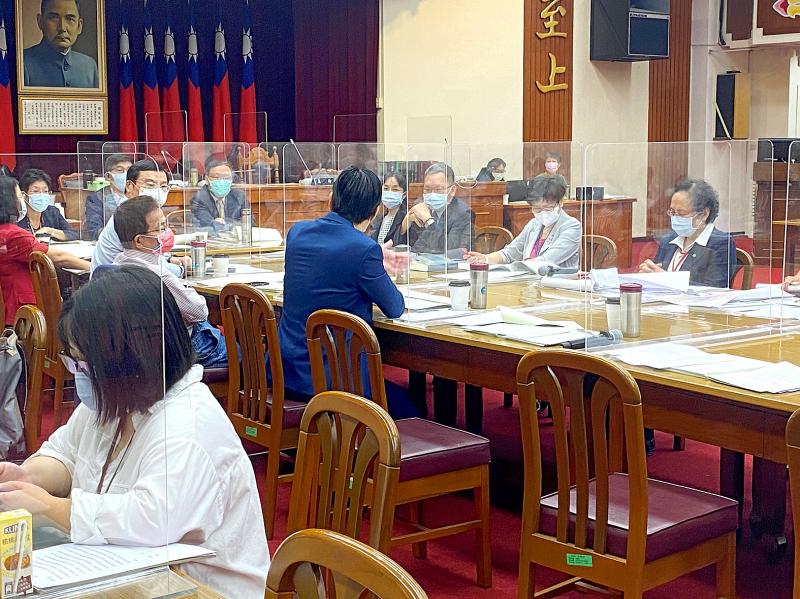The legislature’s Finance Committee yesterday approved an amendment that would provide tariff-free treatment for 234 products imported from three of Taiwan’s diplomatic allies — Belize, Honduras and Paraguay.
The proposed amendment to the Customs Import Tariff Act (海關進口稅則), approved by the Executive Yuan in August, is to go to the legislative floor to be reviewed and voted on.
The bill would allow the import duty-free of 199 products from Belize, 25 products from Honduras and 10 products from Paraguay, to be instituted either on a designated date or over three years, the Ministry of Finance said in August.

Photo: Clare Cheng, Taipei Times
Most of the items to be made exempt from import duties are agricultural products, such as beef, pork, fruit and cashew nuts, the ministry said.
If enacted, the amendment would bring Taiwan’s tariff rules in line with a trade deal that Taiwan inked with Belize in September last year, the ministry said.
Taiwan and Belize signed an Economic Cooperation Agreement in September last year, but it has not yet been ratified by the legislature, the Bureau of Foreign Trade said.
The scrapping of tariffs on products imported from Honduras and Paraguay would also be beneficial because it would expand bilateral trade cooperation and help consolidate Taiwan’s diplomatic relations with the two Latin American allies, the ministry said in a statement.
The committee also approved amendments to the Customs Act (關稅法), including those intended to reinforce the monitoring of goods in transit by the Customs Administration, and the management of import and export warehouses.
While lawmakers also considered other amendments aimed at increasing penalties for breaches of the Customs Act by private companies, they were unable to reach a consensus.
Those proposals were set aside for cross-party negotiations, which do not have a time limit.

NEW IDENTITY: Known for its software, India has expanded into hardware, with its semiconductor industry growing from US$38bn in 2023 to US$45bn to US$50bn India on Saturday inaugurated its first semiconductor assembly and test facility, a milestone in the government’s push to reduce dependence on foreign chipmakers and stake a claim in a sector dominated by China. Indian Prime Minister Narendra Modi opened US firm Micron Technology Inc’s semiconductor assembly, test and packaging unit in his home state of Gujarat, hailing the “dawn of a new era” for India’s technology ambitions. “When young Indians look back in the future, they will see this decade as the turning point in our tech future,” Modi told the event, which was broadcast on his YouTube channel. The plant would convert

‘SEISMIC SHIFT’: The researcher forecast there would be about 1.1 billion mobile shipments this year, down from 1.26 billion the prior year and erasing years of gains The global smartphone market is expected to contract 12.9 percent this year due to the unprecedented memorychip shortage, marking “a crisis like no other,” researcher International Data Corp (IDC) said. The new forecast, a dramatic revision down from earlier estimates, gives the latest accounting of the ongoing memory crunch that is affecting every corner of the electronics industry. The demand for advanced memory to power artificial intelligence (AI) tasks has drained global supply until well into next year and jeopardizes the business model of many smartphone makers. IDC forecast about 1.1 billion mobile shipments this year, down from 1.26 billion the prior

People stand in a Pokemon store in Tokyo on Thursday. One of the world highest-grossing franchises is celebrated its 30th anniversary yesterday.

Zimbabwe’s ban on raw lithium exports is forcing Chinese miners to rethink their strategy, speeding up plans to process the metal locally instead of shipping it to China’s vast rechargeable battery industry. The country is Africa’s largest lithium producer and has one of the world’s largest reserves, according to the US Geological Survey (USGS). Zimbabwe already banned the export of lithium ore in 2022 and last year announced it would halt exports of lithium concentrates from January next year. However, on Wednesday it imposed the ban with immediate effect, leaving unclear what the lithium mining sector would do in the